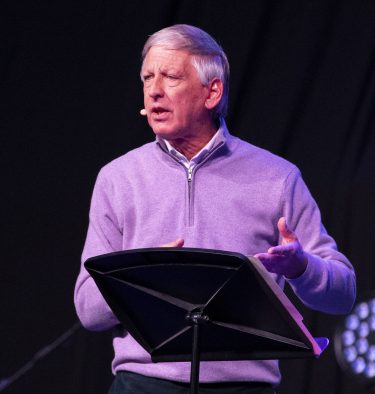
Story by Rick Vacek
Photos by Alan Cisneros
GCU News Bureau
Just about anyone who has spent any time in a church or in the Bible knows the story.
But not many people have thought about it quite this way.

It’s the story of the Good Samaritan, and Grand Canyon University President Brian Mueller applied it to graduating seniors in his Chapel talk Monday morning in GCU Arena. But it really could apply to anyone.
“I think there’s a tremendous amount of application here for work and career and how Jesus thinks that we should think about that,” he said. “… The amount of wisdom here, you could speak for years, I think, on this one story.”
It starts in Luke 10:25:
On one occasion an expert in the law stood up to test Jesus. “Teacher,” he asked, “what must I do to inherit eternal life?”
“What is written in the Law?” He replied. “How do you read it?”
Mueller’s take: “This is interesting to start with because this is an expert in the law – I don’t think he knew that Jesus was the Son of God.”
It continues:
He answered, “‘Love the Lord your God with all your heart and with all your soul and with all your strength and with all your mind,’ and, ‘Love your neighbor as yourself.’”
“You have answered correctly,” Jesus replied. “Do this and you will live.”
But he wanted to justify himself, so he asked Jesus, “And who is my neighbor?”
In reply Jesus said: “A man was going down from Jerusalem to Jericho, when he was attacked by robbers. They stripped him of his clothes, beat him and went away, leaving him half dead. A priest happened to be going down the same road, and when he saw the man, he passed by on the other side. So, too, a Levite, when he came to the place and saw him, passed by on the other side.”
Mueller’s take: “Priest, Levite – professional church workers, people that did ministry in the synagogue, in the temple. And yet their hearts weren’t moved when they see a guy half dead. … That’s a shocking beginning to this story.”
“But a Samaritan, as he traveled, came where the man was; and when he saw him, he took pity on him. He went to him and bandaged his wounds, pouring on oil and wine. Then he put the man on his own donkey, brought him to an inn and took care of him. The next day he took out two denarii and gave them to the innkeeper. ‘Look after him,’ he said, ‘and when I return, I will reimburse you for any extra expense you may have.’

“Which of these three do you think was a neighbor to the man who fell into the hands of robbers?”
The expert in the law replied, “The one who had mercy on him.”
Jesus told him, “Go and do likewise.”
Mueller’s take: “It started with the man’s question. Expert in the law, successful career person, and yet he’s not sure about his salvation. … Jesus could have said a million things in response to that question, but He tells this story. … That’s why this has so much meaning for me, it has such a dramatic impact on me and why I want to talk about it so frequently.”
He asked his audience to consider four things about the story:
First, it’s not a coincidence that Jesus picked those three people. Mueller assumes that the Samaritan, unlike the other two, wasn’t a professional church worker, but he was the one who was moved to act.
“We’ve misjudged Jesus’ expectations,” Mueller said. “There is no difference to Jesus between the sacred and the secular. To Jesus, everything is sacred. All of our work is sacred.”
He addressed his student audience directly:
“Your work … is going to be sacred. Why do I think that’s important? Because I want you to feel really good about going out there and being a business entrepreneur, a mechanical engineer, a biomedical engineer, an IT professional, a cybersecurity specialist, a biologist, a chemist, a doctor, a nurse. That is sacred work to God, and you’re being called into a sacred ministry. You can have kingdom-changing impact in that thing that God has called you to.”
Mueller is thrilled to see a lot of students with majors in secular areas but with minors in Christian or biblical studies. He talked excitedly about two students who want to use dirt and human waste to create energy that could benefit Third World countries.
“They want to be engineers, and they’ve got a gift,” Mueller said. “And they want to use that gift for kingdom-building purposes.”
Another example: After GCU won the WAC men’s basketball tournament Saturday night, Mueller was talking with Lopes assistant coach Ed Schilling, who often leads Bible studies.
Schilling told him that just a few days before, after one of those Bible sessions, he asked how many of the players in the room were ready to give their lives to Jesus. Five raised their hand.
“These coaches … have a ministry going,” Mueller said. “Their ministry is having an impact, and you can have an impact regardless of what you’ve been called to from a passion perspective.”

Mueller’s second point: The Samaritan was able to help because he was prosperous.
“God wants you to be prosperous,” Mueller said. “… It goes back to Genesis and the creation mandate. He put Adam in the garden and He said, ‘Work the garden.’ He didn’t say, ‘Manage the garden.’ He said, ‘Work the garden. Be fruitful. Multiply. Be prosperous. I want you as My people to be prosperous.’
“Why is that important? Because there is no charity in this world without prosperity. Somebody has to produce prosperity in order for there to be charity so that we can lift everybody up.”
Third, Mueller noted that the fifth professional in the story, the innkeeper, took in the injured man. The Samaritan didn’t bring the man to a hospital; he brought him to an inn.
“You would maybe expect the innkeeper to say, ‘I don’t want this guy here. He’s bleeding and half dead. This is a hotel, not a hospital. Take him to a hospital.’”
It's all about taking positive action. Mueller pointed to the example set by the merger of Pure Heart Church in Peoria, where the congregation is mostly White, with nearby Covenant City Church, where the congregation is 98% Black. Dan Steffen, Senior Pastor of Pure Heart, shared that plan in his Chapel talk in January.
“That is a guy committed to taking action, to doing something real,” Mueller said. “I don’t know how that’s going, but I want to go to church there, I want to find out because that is extremely motivating to me.”
Mueller pointed to GCU’s partnerships with other Christian communities: “We can do more together than we can do separately.”
The fourth aspect to consider about the Samaritan story, Mueller said, was how religious people just couldn’t understand Jesus’ ministry.
“These were supposed to be the spiritual leaders of His people, and yet in His mind they didn’t get it,” Mueller said. “… They knew all about what they weren’t supposed to do, but they missed the most important thing, which is what Jesus wanted them to do.”
Mueller added that he is excited about a lot of things going on right now at GCU.
He’s excited about the seniors who are about to graduate.
He’s excited about a campus that in the fall figures to be an “action-oriented place.”
He’s excited, most of all, about a place where “we do our best to live lives that are holy and pleasing to Him. But it doesn’t stop there with us. The next step is … what can we do? What actions can we take?”
There already has been a big action with CityServe International, recounted in this GCU Magazine story. Mueller talked about what’s ahead in that partnership and how it relates to the Good Samaritan parable. The Samaritan had two phases to his care for the injured man – stop the bleeding at the side of the road, then put the man on his donkey and look for a long-term solution at the inn.
The last 12 months have been all about stopping the bleeding. Mueller is looking forward to the solutions that he believes will continue:
“This wasn’t an easy year. We had challenges this year. … I think challenges like this, sometimes when we’re faced with them, they can be daunting and it can get us down.
“But when we see it through and we see it through together, I think those are the kinds of things that someday we’ll look back on and say, ‘Thank you, God, for giving us that challenge. We grew. We became better as people. We identified better with people who have real problems because of that.’”
Contact Rick Vacek at (602) 639-8203 or [email protected].
****
● Chapel replay.
● Next Monday’s speaker: Todd Clark, Slingshot Group
****
Related content:
GCU Today: Chapel to feature reunions with speakers from past
GCU Today: Mackey links humility, prayer with story of Uzziah
GCU Today: Griffin centers Chapel talk on shifting margins
GCU Today: Chapel: Don't pass up lessons from life's offenses
GCU Today: Moore sets a high bar for Musical Worship Chapel
GCU Today: Demeter shows Chapel how faith can save you
GCU Today: Brown's return to Chapel is charged with emotion
GCU Today: Alumni-led Chapel shows how young faith flowers
GCU Today: Chapel lesson hard, but Jesus' gifts are easy to see



































































